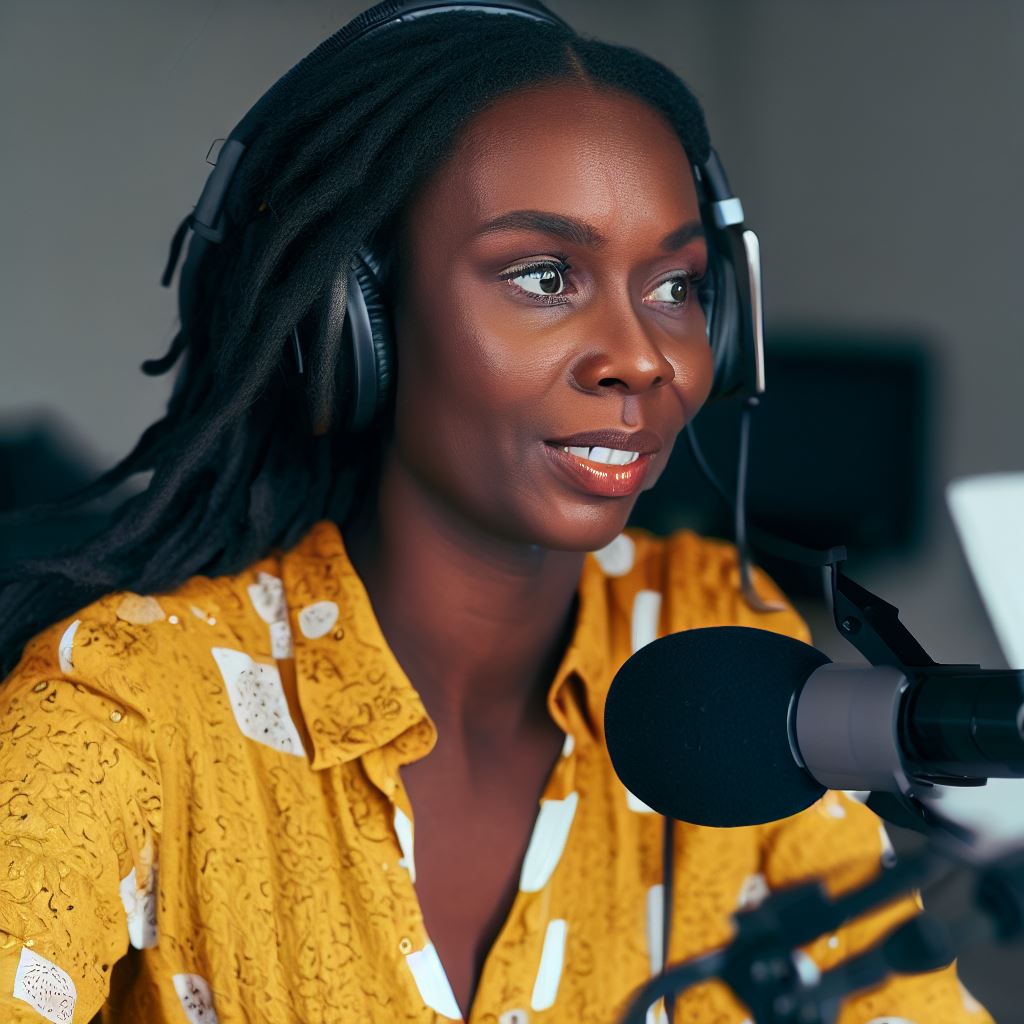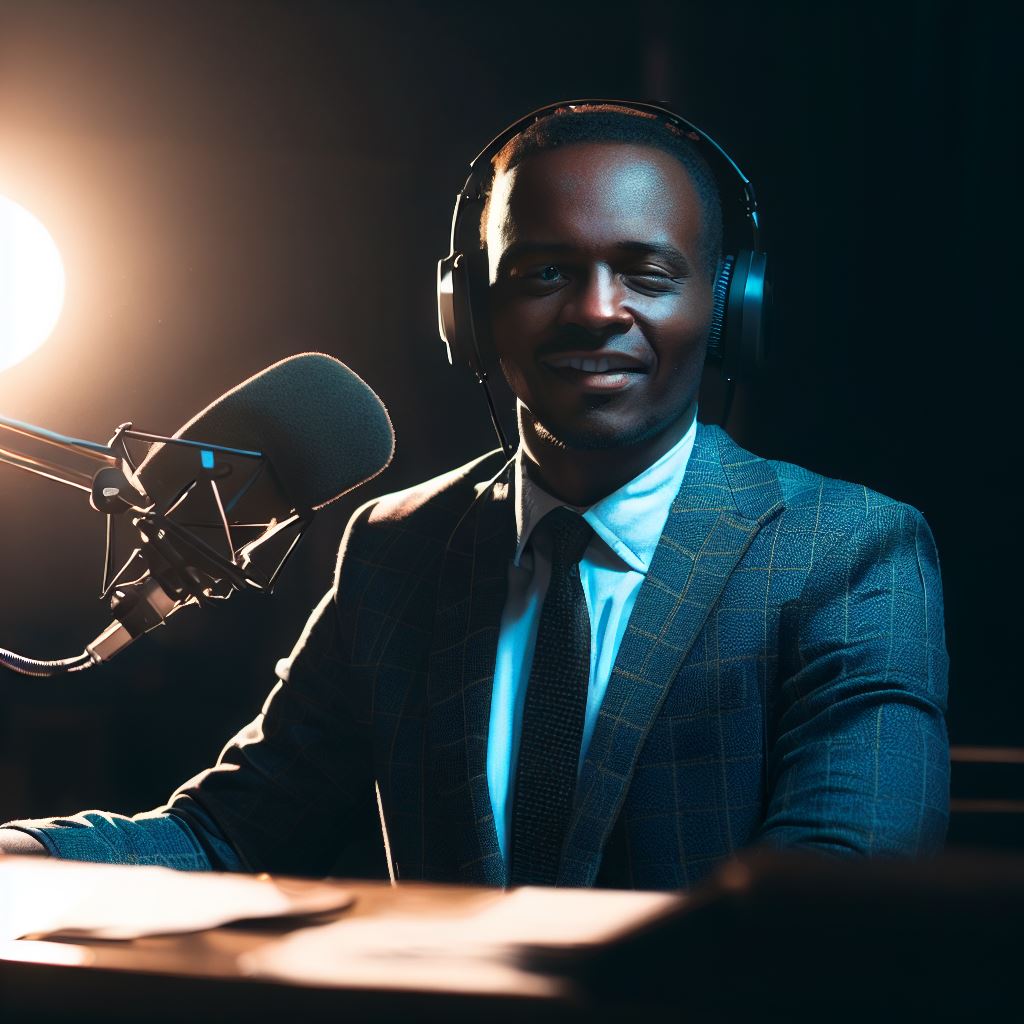Introduction
Explore the path to becoming a radio sports producer in Nigeria with this concise guide.
Nigeria has a thriving radio sports industry, making becoming a radio sports producer a popular choice.
In the heart of Nigeria’s vibrant sports landscape lies an exciting and dynamic profession – that of a Radio Sports Producer.
As the nation’s passion for sports continues to surge, the role of a sports producer has become increasingly vital in delivering engaging and informative content to avid fans.
Radio sports producers in Nigeria gain recognition and have opportunities to work with top athletes and teams.
This comprehensive guide is designed to illuminate the path for aspiring individuals looking to carve their niche in this exhilarating field.
From the intricacies of crafting compelling narratives to the technical prowess required for seamless broadcasts, this guide will navigate through the essential skills and knowledge base needed to thrive as a Radio Sports Producer in Nigeria.
Join us as we embark on a journey that not only celebrates the spirit of sports but also unveils the artistry behind its broadcast, shedding light on the numerous opportunities and challenges that await those who dare to step into this electrifying realm.
Understanding the Role of a Radio Sports Producer
A. Definition of a radio sports producer
A radio sports producer is an individual responsible for overseeing and coordinating the production of sports-related content for radio broadcasts.
B. Responsibilities and duties
- Planning and organizing: The producer is in charge of planning and organizing the sports content for radio broadcasts.
- Research and content development: They conduct research on sports events, teams, and players to ensure accurate and engaging content.
- Guest coordination: Producers arrange interviews with sports personalities, athletes, coaches, and experts to provide insightful commentary.
- Scriptwriting and editing: They write and edit scripts for presenters, ensuring concise and compelling delivery of sports news and analysis.
- Technical coordination: Producers coordinate with technicians to ensure smooth broadcasting, including sound mixing, audio clips, and live reporting.
- On-air direction: During live broadcasts, producers direct presenters, provide cues, and manage time to maintain a seamless flow of the show.
C. Importance of a radio sports producer in the industry
- Quality sports content: A skilled producer enhances the quality of radio sports broadcasts through effective content planning and organization.
- Engaging listener experience: Producers create engaging and informative radio shows that captivate sports enthusiasts and keep them tuned in.
- Accurate information: With thorough research and fact-checking, producers ensure the delivery of accurate and up-to-date sports information.
- Professionalism and credibility: A producer’s expertise adds credibility to radio sports broadcasts, attracting advertisers and building a loyal audience.
- Enhanced storytelling: Producers use their creativity in scriptwriting and editing to enhance the storytelling aspect of sports broadcasts.
- Efficient broadcast execution: Their coordination with technicians and on-air direction results in smooth and professional radio sports broadcasts.
- Industry growth and development: Radio sports producers contribute to the growth and development of the sports broadcasting industry in Nigeria.
In essence, a radio sports producer plays a crucial role in the industry by overseeing the production of sports content for radio broadcasts.
Their responsibilities include planning, research, guest coordination, scriptwriting, technical coordination, and on-air direction.
They enhance the quality of broadcasts, engage listeners, provide accurate information, maintain professionalism, enhance storytelling, and ensure efficient execution.
Their contributions not only benefit the audience and advertisers but also contribute to the growth and development of the sports broadcasting industry.
Read: Teaching Traditional Games: A PE Instructor in Nigeria
Necessary Skills and Qualifications
A successful radio sports producer in Nigeria requires a combination of specific skills and qualifications:
A. Knowledge of Sports
- Deep understanding of various sports, rules, and regulations is essential.
- Stay updated with the latest trends, news, and developments in the sports industry.
- Ability to analyze and offer insightful commentary on sports events.
B. Broadcasting Skills
- Strong verbal communication skills to effectively present sports stories, analysis, and predictions.
- A clear and concise speaking voice that engages listeners and conveys enthusiasm.
- Ability to conduct interviews with players, coaches, and sports experts.
- Adaptability to different broadcasting formats, including live shows, pre-recorded segments, and podcasts.
C. Technical Skills
- Proficiency in using audio and recording equipment, editing software, and broadcasting tools.
- Knowledge of sound mixing, editing, and processing to produce high-quality radio content.
- Ability to troubleshoot technical issues that may arise during live broadcasts.
D. Communication and Organization Skills
- Strong interpersonal skills to foster relationships with guests, coworkers, and listeners.
- Excellent time management and organization skills to meet deadlines and handle multiple tasks.
- Ability to work in a team and collaborate effectively with other radio professionals.
- Strong research and writing skills to prepare for shows and create compelling content.
E. Education and Qualifications Needed
- A bachelor’s degree in journalism, broadcasting, or a related field is valuable.
- Previous experience in radio production or sports journalism is advantageous.
- Participating in internships or volunteering at radio stations can provide practical experience.
- Continuously seek opportunities for professional development and attend workshops or training programs.
By acquiring and honing these necessary skills and qualifications, you can pave your path towards becoming a radio sports producer in Nigeria.
Read: Physical Education Policies in Nigeria: A Deep Dive
Steps to Becoming a Radio Sports Producer in Nigeria
A. Pursue a relevant degree or certification
- Enroll in a media-related degree program, such as journalism, communications, or broadcasting.
- Consider specialized courses in sports broadcasting or radio production.
- Obtain certifications like Radio Production Certification (RPC) if available.
B. Gain experience through internships or entry-level positions
- Seek internships at local radio stations, sports networks, or online sports platforms.
- Start as a production assistant, learning the ropes of radio sports production.
- Volunteer for sports events coverage to build a practical skillset.
C. Develop a strong portfolio
- Create a portfolio showcasing your work, including audio clips, show scripts, and event coverage.
- Highlight your ability to handle various sports genres and formats.
- Showcase your creativity and unique approach to sports production.
D. Networking and building connections in the industry
- Attend sports industry events, seminars, and workshops to meet professionals.
- Connect with mentors who can offer guidance and insights.
- Join online forums or social media groups related to sports production.
E. Continuing education and staying up-to-date with industry trends
- Stay informed about the latest developments in radio and sports broadcasting.
- Consider advanced courses or workshops to enhance your skills.
- Adapt to emerging technologies and production tools.
Becoming a radio sports producer in Nigeria requires dedication and a well-structured approach.
Start with a solid educational foundation, gain hands-on experience, and continuously improve your skills.
Networking and staying updated with industry trends will help you break into and thrive in this competitive field.
Read: Training Tips from Assistant Athletic Trainers in Nigeria

Challenges and Opportunities in the Field
A. Competition in the industry
- Radio sports production in Nigeria faces stiff competition from other media platforms.
- Rival broadcasters strive to attract audiences and secure advertising deals.
- Innovative content and unique approaches are necessary to stay ahead in this competitive landscape.
- Establishing a strong personal brand and building a loyal following can help beat the competition.
B. Limited resources and opportunities in Nigeria
- Limited funding and lack of infrastructure pose challenges for radio sports producers.
- Access to modern equipment and technology may be restricted.
- Opportunities for career growth and promotions may also be limited within the industry.
- Despite these challenges, resourcefulness and creativity can help overcome limitations.
C. Importance of perseverance and passion
- Working in the radio sports production field requires immense perseverance.
- Challenges and setbacks are common, but passion fuels the drive to overcome them.
- The ability to handle pressure and maintain enthusiasm during difficult times is crucial.
- Holding onto the initial excitement and passion for the job can lead to long-term success.
D. Potential growth and success in the field
- Despite the challenges, radio sports production offers a promising avenue for career growth.
- The industry is constantly evolving, providing opportunities to embrace new technologies and trends.
- Talented individuals can rise through the ranks and reach positions of influence and leadership.
- With dedication, hard work, and continuous learning, professionals can achieve significant success.
E. Ways to overcome challenges and seize opportunities
- Networking and building relationships with industry professionals can open doors.
- Embracing digital platforms for content creation and distribution expands reach and audience engagement.
- Seeking additional training and certifications helps develop necessary skills and stay updated.
- Collaboration with like-minded individuals and seeking mentorship provides guidance and support.
- Adaptability to change and willingness to take risks enable professionals to navigate challenges and seize opportunities.
In general, the field of radio sports production in Nigeria presents both challenges and opportunities.
Competing in a highly competitive industry, navigating limited resources, and maintaining perseverance are hurdles to overcome.
However, with passion, dedication, and a proactive approach, individuals can find success, achieve growth, and contribute to the thriving radio sports production landscape in Nigeria.
The path may not be easy, but it rewards those who are committed and willing to seize opportunities when they arise.
Read: An Overview: Assistant Athletic Trainer Career in Nigeria
Resources and Support for Aspiring Radio Sports Producers
A. Online platforms and courses
- Join online platforms like “RadioSportsPro.com” and “SportsProdNetwork.com” for access to resources and courses.
- Take advantage of online courses such as “Introduction to Radio Sports Production” and “Advanced Techniques in Sports Commentary.”
- Participate in webinars and workshops offered by industry experts to enhance your skills and knowledge.
- Utilize online forums and communities to connect with fellow aspiring producers and learn from their experiences.
- Subscribe to podcasts and YouTube channels dedicated to radio sports production for valuable insights and tips.
B. Industry associations and organizations
- Join professional associations like the Nigerian Radio Sports Producers Association (NRSPA) for networking and support.
- Participate in industry conferences and seminars organized by associations to stay updated on trends and best practices.
- Attend workshops and training sessions offered by these associations to enhance your understanding of the field.
- Connect with fellow professionals through these associations to expand your network and learn from their expertise.
- Access resources such as industry reports, case studies, and research papers provided by the associations.
C. Mentoring and guidance from professionals
- Seek mentorship from established radio sports producers who can provide guidance and advice.
- Reach out to professionals through networking events, conferences, or social media platforms.
- Attend career fairs and job shadowing opportunities to connect with experienced professionals in the field.
- Seek internships or apprenticeships at radio stations to learn from seasoned producers.
- Join mentorship programs offered by organizations or create informal mentorship relationships with industry experts.
D. Networking events and conferences
- Attend radio sports production conferences and expos to meet industry professionals and potential employers.
- Participate in panels and workshops at these events to showcase your knowledge and gain visibility.
- Join sports broadcast associations and attend their networking events to meet like-minded individuals.
- Attend local and international sports events to network with broadcasters and build connections in the industry.
- Utilize social media platforms to connect with professionals and participate in virtual networking events.
By utilizing these resources and support systems, aspiring radio sports producers in Nigeria can enhance their skills, expand their network, and stay updated on industry trends.
Continuous learning and connection with professionals is crucial for success in this competitive field.
With dedication and perseverance, you can strive towards becoming a proficient and sought-after radio sports producer in Nigeria.
Conclusion
We explored the responsibilities of a radio sports producer in Nigeria, including coordinating live broadcasts, conducting interviews, and managing production equipment.
Despite the challenges, pursuing a career in sports production can be rewarding and fulfilling.
Emphasize the importance of passion, hard work, and continuous learning.
Start by gaining experience through internships or volunteering at local radio stations.
Seek mentorship from established professionals and build a strong network in the industry.
Stay determined and always be willing to adapt and improve.
In summary, becoming a radio sports producer in Nigeria requires dedication, perseverance, and a genuine love for sports.
While it may not be an easy path, it offers tremendous opportunities for growth and success.
Keep pushing forward, never stop learning, and always believe in your abilities. Good luck on your journey to becoming a radio sports producer!




